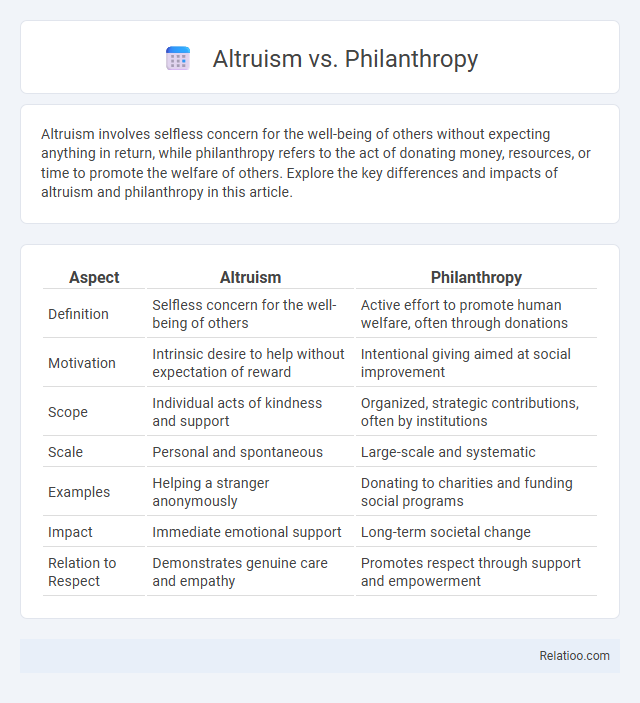Altruism involves selfless concern for the well-being of others without expecting anything in return, while philanthropy refers to the act of donating money, resources, or time to promote the welfare of others. Explore the key differences and impacts of altruism and philanthropy in this article.
Table of Comparison
| Aspect | Altruism | Philanthropy |
|---|---|---|
| Definition | Selfless concern for the well-being of others | Active effort to promote human welfare, often through donations |
| Motivation | Intrinsic desire to help without expectation of reward | Intentional giving aimed at social improvement |
| Scope | Individual acts of kindness and support | Organized, strategic contributions, often by institutions |
| Scale | Personal and spontaneous | Large-scale and systematic |
| Examples | Helping a stranger anonymously | Donating to charities and funding social programs |
| Impact | Immediate emotional support | Long-term societal change |
| Relation to Respect | Demonstrates genuine care and empathy | Promotes respect through support and empowerment |
Understanding the Concepts: Altruism and Philanthropy
Altruism involves selflessly acting to benefit others without expecting anything in return, often motivated by empathy and compassion. Philanthropy entails charitable actions or donations aimed at improving societal well-being, frequently organized through foundations or formal initiatives. Understanding these concepts highlights that altruism is a personal moral principle, whereas philanthropy represents structured efforts to address broader social issues.
Historical Origins of Altruism and Philanthropy
Altruism, rooted in 19th-century philosophy by Auguste Comte, emphasizes selfless concern for the well-being of others, forming the basis for many ethical systems, while philanthropy historically emerged during the Enlightenment as organized efforts to promote human welfare through charitable giving and social reform. Your understanding of these concepts benefits from recognizing that altruism reflects a moral imperative, whereas philanthropy operates as a strategic, often institutionalized, practice aimed at societal improvement. These historical origins highlight altruism's philosophical foundation versus philanthropy's practical application in addressing social issues.
Core Motivations Behind Altruism
Core motivations behind altruism stem from intrinsic desires to help others without expecting anything in return, driven by empathy and moral values. Philanthropy often involves strategic giving and resource allocation to create social impact, sometimes influenced by personal or corporate goals. Altruism emphasizes selfless concern for the well-being of others, distinguishing it from philanthropy's occasional focus on recognition or tax benefits.
Driving Forces Behind Philanthropy
The driving forces behind philanthropy stem from a combination of altruism, personal values, and social responsibility that motivate individuals to donate resources for the greater good. Unlike pure altruism, which emphasizes selfless concern for others without expectation of reward, philanthropy often involves strategic giving aligned with long-term societal impact and personal legacy. Understanding these motivations can help you harness your own philanthropic efforts to create meaningful change while balancing personal fulfillment and community benefit.
Key Differences: Altruism vs Philanthropy
Altruism involves selfless concern for the well-being of others without expecting anything in return, often expressed through personal acts of kindness or sacrifice. Philanthropy refers to the organized effort to promote the welfare of others, usually through financial donations or structured charitable activities conducted by individuals or institutions. The key difference lies in altruism's emphasis on intrinsic motivation and direct action, while philanthropy typically manifests through strategic, large-scale giving aimed at systemic impact.
Examples of Altruistic Acts
Altruistic acts often involve selfless behaviors such as donating anonymously to those in need, volunteering time at shelters, or helping strangers without expecting anything in return. Philanthropy typically includes organized efforts like funding educational scholarships or supporting large-scale humanitarian projects. Understanding Your motivation behind altruistic acts can help distinguish between personal generosity and structured charitable giving.
Notable Philanthropic Initiatives
Notable philanthropic initiatives include the Bill & Melinda Gates Foundation's global health programs, Warren Buffett's commitment to the Giving Pledge, and the Chan Zuckerberg Initiative's focus on education and science. These efforts exemplify philanthropy's strategic deployment of resources to address systemic social issues, contrasting with altruism's individual acts of selfless kindness. Philanthropy leverages large-scale funding and organizational structures to create sustainable impact across communities worldwide.
Impact on Society: Altruism and Philanthropy Compared
Altruism involves selfless concern for the well-being of others, often driving actions without expectation of reward, while philanthropy typically entails organized efforts, including financial contributions, to address social issues. The impact on society from altruism manifests through personal acts of kindness that build trust and community resilience, whereas philanthropy creates large-scale change by funding institutions and programs. Your engagement in altruistic acts can complement philanthropic initiatives, enhancing overall social welfare and promoting sustainable development.
Challenges and Ethical Considerations
Altruism, philanthropy, and prosocial behavior each face distinct challenges and ethical considerations, such as balancing self-interest with genuine concern for others and ensuring transparency in resource allocation. Altruism emphasizes selfless acts without expectation of reward, but can raise issues of burnout and paternalism. Philanthropy involves strategic giving that may prioritize donor recognition over recipient needs, highlighting the importance of ethical frameworks to avoid exploitation and maintain equitable impact.
Altruism and Philanthropy in the Modern World
Altruism in the modern world emphasizes selfless concern for the well-being of others, often manifesting through everyday acts of kindness and voluntary support without expectation of reward. Philanthropy, distinct yet related, involves strategic resource allocation, such as donations and funding initiatives, aimed at addressing social issues and creating long-term impact. Both concepts drive social progress but differ in scope and approach: altruism centers on individual motives, while philanthropy leverages structured efforts for systemic change.

Infographic: Altruism vs Philanthropy
 relatioo.com
relatioo.com